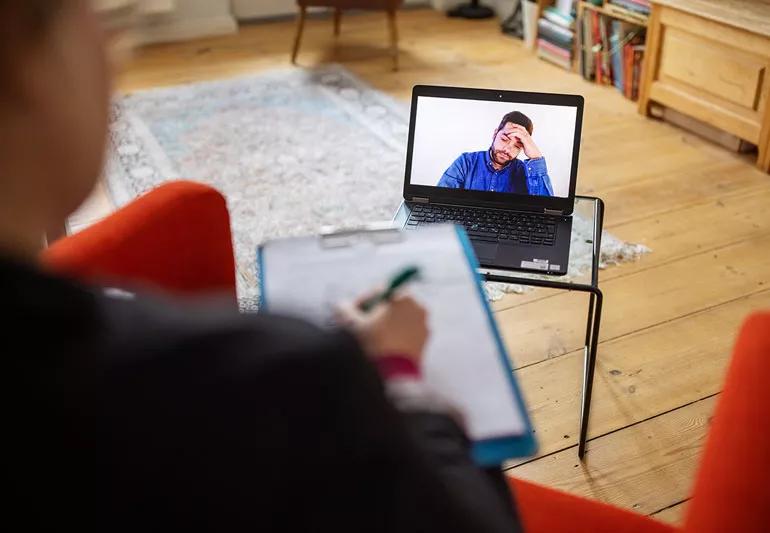Tips for new patients and those continuing therapy

Whether you’re just starting therapy or you’ve been in therapy for years, finding a new therapist is one of the most important parts of the process. It’s also one of the most difficult – but it doesn’t have to be.
Advertisement
Cleveland Clinic is a non-profit academic medical center. Advertising on our site helps support our mission. We do not endorse non-Cleveland Clinic products or services. Policy
The relationship between a patient and their therapist is at the very center of a patient’s therapy experience. It requires trust, cooperation and understanding to achieve a positive outcome.
So it’s no wonder why it may seem like a daunting challenge, even if you’re not new to the therapy process. We talked to Dawn Potter, PsyD, about what to look for and keep in mind when undergoing that search for a new therapist.
Before you get your search underway, you have to make a few choices that will help guide you in the right direction.
If this is your first time for therapy, Dr. Potter says it’s essential you know what kind of therapy you’re looking for before you begin the search. “Are you looking for individual, relationship or family therapy?” asks Dr. Potter.
“You need to consider if you’re looking for treatment for a specific problem that requires a specialist,” she continues. “Maybe you’re just looking for general growth. That decision will also determine what kind of therapist and what qualifications you’re looking for.”
If you’re continuing therapy or returning after a break, you probably have the answers to those previous questions. But that doesn’t mean there aren’t choices to make as you look for your new therapist.
Advertisement
No matter your reason for deciding to seek a new therapist, Dr. Potter advises focusing on what you did and didn’t like about your previous therapy experiences. “It’s important to search for a therapist that has the qualities that you like, that you’re looking for.”
That requires a bit of leg work on your part in researching therapists, reading background information, bios and anything else that your potential therapists have shared.
If that information is lacking – and this goes for people new to therapy, too – Dr. Potter says it’s okay to reach out to that therapist or their office for a more informal chat before moving forward with any official appointments. “Even if you don’t hear back directly from the therapist, there’s a good chance that someone in the office will be able to give you more information,” she says.
It’s important to keep your primary care provider in the loop about your decision to pursue therapy, whether it’s your first time or just changing therapists. “It’s always a good idea to talk to your primary care provider about mental health,” Dr. Potter says.
While you might feel nervous about it at first, most have the experience to be another resource in your search, she says. “Many will be able to give you referrals, and those referrals are often covered by the same insurance plan you use for that provider which is a big logistical positive.”
Your healthcare provider will also be an important person to speak to if you and your therapist think you might benefit from medication as part of your treatment.
If you’re open about your mental health experience with those close to you, some may suggest their therapist to you as a possibility. While referrals are always helpful, there are a few things to keep in mind when considering ones that come from friends and family.
First, says Dr. Potter, consider that you may not be struggling with the same issue as the person who gave you the suggestion. That’s where background research can come in handy, double-checking if their therapist deals with the issue for which you’re seeking help.
The other things to keep in mind are the dual issues of privacy and boundaries. “You don’t want to see the same therapist as your partner, your spouse or even a family member,” says Dr. Potter. “Relationship issues are often at the center of your work in therapy and those boundaries are important.”
Dr. Potter notes that therapists have an ethical obligation to not individually treat two people closely involved with each other – whether it’s romantic, friendly or family – because it could complicate treatment for either person and cause mixed loyalties for the therapist. “A therapist could treat them together as a family unit,” Dr. Potter notes, “but not as separate patients.”
Advertisement
Cultural considerations are another important aspect when you’re choosing a therapist. “You want to make sure that therapist has an understanding of your background,” says Dr. Potter. “Whether it’s your race, ethnic group, religious background, or sexual orientation, you should check to see what experience they have in those areas.”
It’s a risk, she continues, that you might choose a therapist who might not be familiar with that background, that you might have to educate them on your background if you think they’d otherwise be a good fit.
“In an ideal world, you don’t have to educate your therapist. But your therapist doesn’t have to come from the same background as you to have experience in identity development, cultural humility or possess a breadth of training with different cultures,” she adds. “They don’t necessarily have to be the same as you. They just have to have experience, training and openness to learning and educating themselves.”
Choosing a therapist can be a difficult process, but be sure you get a full picture of a therapist’s experience. “Don’t judge a book by its cover. Look at their qualifications,” says Dr. Potter. “Look at whether or not they’re a licensed provider, where they went to school and how long they’ve been licensed.”
Advertisement
You want to avoid someone who is an unlicensed provider, she adds. “They could be very helpful in some situations but you don’t have that security of knowing this person has the necessary education, classes and training experiences that are needed to do the job.”
Once you’ve chosen your new therapist, it’s important to remember it usually takes several appointments to get a good feel for your relationship. “For most therapists, the first appointment is an intake appointment,” Dr. Potter notes. “It may not feel very therapeutic, so you want to make sure you get at least one other full therapy visit.”
But the intake appointment is still an important part of the process. “A therapist typically does a pretty thorough intake and should be prepared to refer you to someone else if they feel the need,” she says. “They have an ethical obligation to only treat people that they believe they can help.”
Plus, that intake appointment is an opportunity to set the path forward for your work together and to make a plan that best serves you.
Finally, keep an open mind as you begin your work with your therapist. If this is your first time in therapy, go in with a sense of what you want and need. If you’ve done therapy before, consider what worked for you before and what didn’t.
Advertisement
Dr. Potter notes that those with less experience in therapy, “may not have a sense of goals or what they want out of therapy. It could be developing coping skills, being able to vent or practicing mindfulness. A therapist is never going to give direct advice, but can help you come up with plans for problems.”
You don’t need to know what the best path to treatment is as you begin. Knowing who you are and what you want is important, says Dr. Potter, but if the relationship between therapist and patient works, it’s an approach that can be solved together. “You might or might not have an idea but that’s okay. You can trust me, as your therapist, to help you figure it out.”

Sign up for our Health Essentials emails for expert guidance on nutrition, fitness, sleep, skin care and more.
Learn more about our editorial process.
Advertisement

Exploring your hidden side can lead to better understanding of what makes you tick

A single song can go a long way in helping you focus, recall memories and develop new neural connections in your brain

Using terms like ‘gaslighting,’ ‘trauma dumping’ and ‘boundaries’ in your everyday life may not be healthy or productive

This alternative brain-body therapy focuses on unlocking pent-up feelings, memories and tension that may be stuck in your brain and body

Rather than letting feelings of anger take over, try turning to self-awareness, mindfulness and time-outs

Research types, find a therapist who fits you and remember — therapy isn’t a sign of weakness

Past negative experiences can affect you throughout your life

There are a variety of therapies, all of which can help you function better in your everyday life

Even small moments of time outdoors can help reduce stress, boost mood and restore a sense of calm

A correct prescription helps your eyes see clearly — but as natural changes occur, you may need stronger or different eyeglasses

Both are medical emergencies, but they are very distinct events with different causes